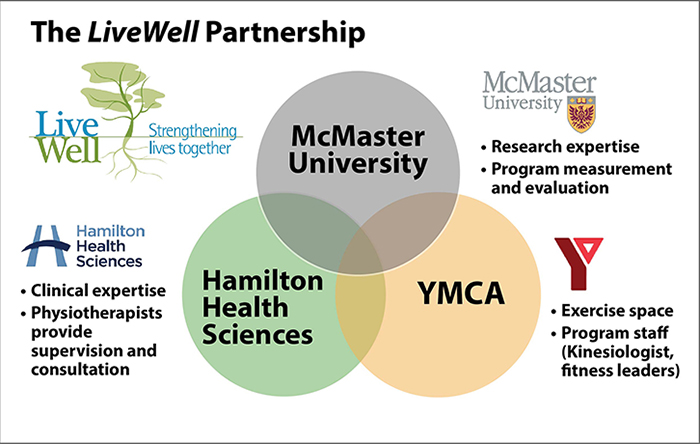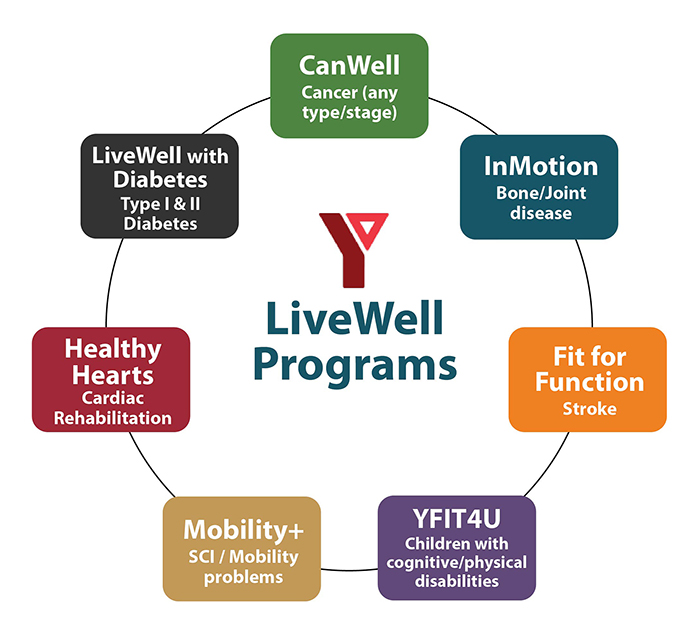LiveWell and Fit for Function: Community-based exercise rehabilitation and wellness programs

Professor and Assistant Dean (Acting) in the School of Rehabilitation Science at McMaster University
Low levels of physical activity effect mobility and overall health. Being inactive contributes to difficulty walking and moving around which increases the risk for future health problems. Decreased movement skills (needed for everyday activities) and physical inactivity also result in lower quality of life. Regular exercise and enhanced physical activity can improve our movement ability and overall health. Formal rehabilitation services best address this, but these services are time limited in our healthcare system. In addition, many modifiable risk factors such as lifestyle issues continue to be poorly managed which can result in disability associated with chronic conditions such as heart disease, depression and diabetes. There is an urgent need to minimize the burden and costs of disability. Here we highlight two innovative and sustainable community programs to optimize function and minimize the burden and costs of disability.
LiveWell is a community partnership developed between Hamilton Health Sciences (HHS), McMaster University, and the YMCA of Hamilton, Burlington, and Brantford. LiveWell promotes wellness and builds healthy communities by providing access to programs for special populations. Physiotherapists from HHS plan and supervise the programs; the YMCA provides space and staff to run the programs; and McMaster is involved in evaluating the programs. LiveWell currently includes a series of programs including: InMotion, Healthy Hearts, LiveWell with Diabetes, Mobility+, CanWell, YFit4U and Fit for Function delivered through YMCAs.


Fit for Function: A community wellness program for persons with stroke
Fit for Function is a CIHR-funded randomised controlled trial (RCT) that will evaluate an exercise and self-management intervention program for people effected by stroke. Three YMCA sites in south-central Ontario (Downtown Hamilton, Brantford and Niagara) are participating in this trial, which is also supported by physiotherapists from Hamilton Health Sciences, Brantford Community Health System and Niagara Health Care System.
This evidence-based initiative has few demands on resources, uses existing local community program infrastructures, and will serve as a model for on-going, accessible, effective and cost-effective wellness programs for individuals with chronic conditions.
In this RCT, Drs Richardson and Tang (Co-Pls) are comparing Fit for FunctionFootnote 1 and Living with StrokeFootnote 2 with a control group that receives a 12-week free YMCA membership. Participation is self-determined. Outcomes of community integration (primary outcome), physical activity levels, physical function, quality of life, heart health, and self-management are all evaluated. Retention of program benefits are also evaluated, along with healthcare usage, costs, and predictive markers associated with response to the sessions.
We are currently undertaking further work (funded by the Canadian MSK Rehab Research Network) to ensure fidelity (meaning the essential components of programs are delivered as intended in the research protocol) of community-based interventions like Fit for Function. Our priority is to develop a process that monitors and maintains the success of community-based programming, which translates rehabilitation strategies into practice at a community level to maximize patient function and mobility.
- Date modified: